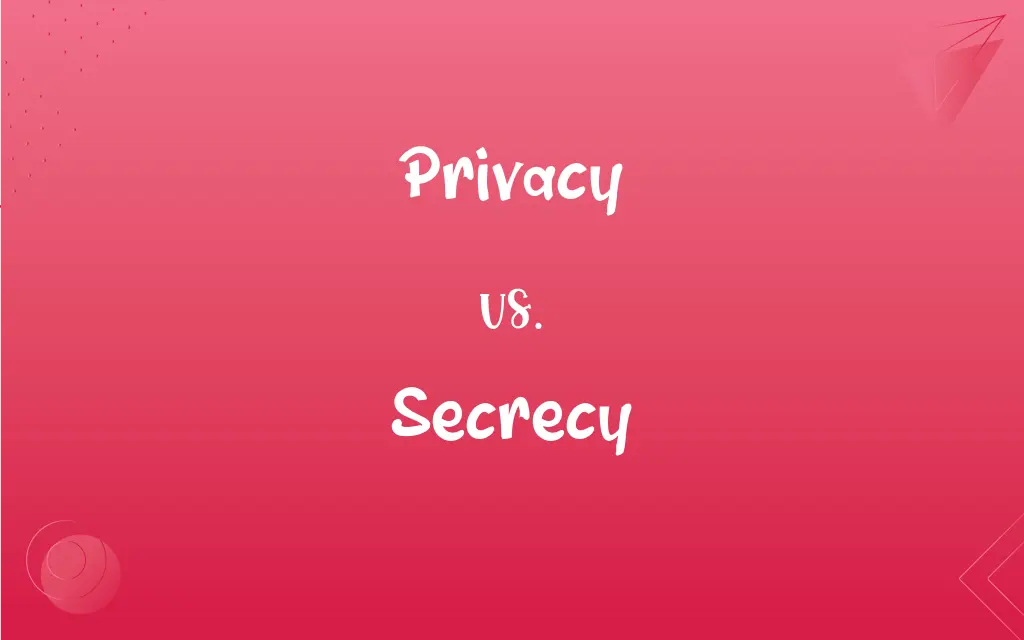Privacy vs. Secrecy: What's the Difference?
Edited by Aimie Carlson || By Janet White || Published on December 21, 2023
Privacy is the right to keep personal matters and relationships confidential, whereas secrecy involves intentionally keeping information hidden to avoid scrutiny or discovery.

Key Differences
Privacy refers to the control over one's personal information and the choice of when to share it with others, emphasizing respect for individual autonomy. Secrecy, in contrast, implies a deliberate concealment of information, often to protect personal interests or to prevent others from knowing the truth.
Privacy is often considered a fundamental human right, recognized for protecting personal freedom and dignity. Secrecy, however, may have negative connotations, as it can be associated with deception or the withholding of truth for various reasons, including manipulation or personal gain.
In privacy, the focus is on the individual's discretion over their personal space, communications, and data. Secrecy, on the other hand, can extend beyond personal matters to include the concealment of information in professional, political, or social contexts.
Privacy is seen as essential for personal development and maintaining healthy boundaries in relationships. Conversely, secrecy often implies a breach of trust or the presence of hidden agendas, which can lead to mistrust and conflict in interpersonal relationships.
Privacy is respected and protected by laws in many jurisdictions, highlighting its importance in a democratic society. Secrecy, while sometimes necessary (e.g., in matters of national security), is often scrutinized, especially when it conflicts with transparency and accountability principles.
ADVERTISEMENT
Comparison Chart
Connotation
Neutral or Positive, focused on individual rights
Often Negative, associated with hiding or withholding
Purpose
Protects personal autonomy and freedom
Aims to keep information hidden for specific reasons
Social Perception
Generally viewed as a fundamental right
Can be viewed with suspicion or distrust
Legal Recognition
Protected by laws in many societies
Subject to legal and ethical scrutiny
Impact on Relationships
Promotes respect for boundaries and personal space
Can lead to mistrust and conflict if abused
ADVERTISEMENT
Privacy and Secrecy Definitions
Privacy
Privacy is the right to keep one's personal matters and relationships confidential.
He valued his privacy and rarely discussed his life with others.
Secrecy
Secrecy is the condition of being kept hidden from knowledge or view.
The secrecy surrounding the project created a lot of speculation.
Privacy
Privacy involves the control over access to one's personal information.
She set her social media profiles to private to protect her privacy.
Secrecy
Secrecy involves deliberately concealing information.
They communicated in secrecy to avoid being overheard.
Privacy
Privacy is the state of being free from public attention.
She closed the curtains for privacy.
Secrecy
Secrecy is the action of keeping something hidden or secret.
The recipe for the famous sauce was a family secrecy.
Privacy
Privacy is the condition of being secluded from the presence or view of others.
He retreated to his office for some privacy.
Secrecy
Secrecy is the practice of hiding one's actions or intentions.
His secrecy about his whereabouts raised suspicions.
Privacy
Privacy is the state of not being observed or disturbed by others.
The cabin in the woods offered the perfect privacy.
Secrecy
Secrecy is maintaining confidentiality to avoid disclosure.
The agent operated in complete secrecy.
Privacy
The quality or condition of being secluded from the presence or view of others
I need some privacy to change into my bathing suit.
Secrecy
The quality or condition of being secret or hidden; concealment
Work done in secrecy.
Privacy
The state of being free from public attention or unsanctioned intrusion
A person's right to privacy.
FAQs
Can privacy be legally enforced?
Yes, privacy is often protected by laws.
Can secrecy harm relationships?
Yes, secrecy can lead to mistrust and conflict in relationships.
Is privacy a human right?
Many consider privacy a fundamental human right.
What is privacy?
Privacy is the right to keep personal matters and information confidential.
Why is privacy important?
Privacy is crucial for personal autonomy and protecting individual rights.
Are privacy and secrecy the same?
No, they differ in intent and context.
When is secrecy necessary?
Secrecy is sometimes necessary to protect sensitive information or personal safety.
What are the risks of secrecy?
Secrecy can lead to mistrust, suspicion, and ethical dilemmas.
What is secrecy?
Secrecy involves intentionally keeping information hidden.
Is secrecy legal?
Secrecy can be legal, but it depends on the context and intent.
Can one have privacy without secrecy?
Yes, one can maintain privacy without concealing information.
How is secrecy viewed in society?
Secrecy is often viewed with suspicion or as necessary for certain purposes.
Why do governments maintain secrecy?
For national security, diplomatic, or strategic reasons.
Can companies violate privacy?
Yes, if they misuse personal information without consent.
Can privacy be waived?
Yes, individuals can choose to waive their privacy.
How does privacy affect relationships?
Privacy helps maintain healthy boundaries in relationships.
How does society view privacy?
Society generally views privacy as a necessary right.
How does technology affect privacy?
Technology can both enhance and threaten privacy.
What is an example of necessary secrecy?
Protecting military or trade secrets.
Is secrecy always intentional?
Secrecy is typically intentional, though sometimes information is kept hidden unintentionally.
About Author
Written by
Janet WhiteJanet White has been an esteemed writer and blogger for Difference Wiki. Holding a Master's degree in Science and Medical Journalism from the prestigious Boston University, she has consistently demonstrated her expertise and passion for her field. When she's not immersed in her work, Janet relishes her time exercising, delving into a good book, and cherishing moments with friends and family.
Edited by
Aimie CarlsonAimie Carlson, holding a master's degree in English literature, is a fervent English language enthusiast. She lends her writing talents to Difference Wiki, a prominent website that specializes in comparisons, offering readers insightful analyses that both captivate and inform.






































































